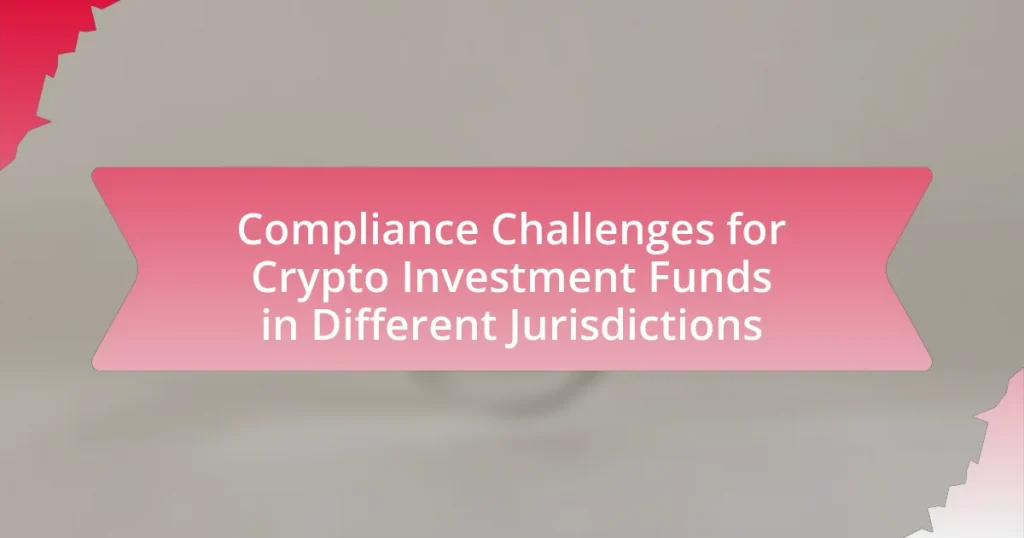The article focuses on the compliance challenges faced by crypto investment funds across different jurisdictions. It outlines the complexities of navigating varying regulatory frameworks, including anti-money laundering (AML) and know your customer (KYC) requirements, as well as tax obligations. Key regulations in the United States and Europe are examined, highlighting the fragmented regulatory landscape in the U.S. and the unified approach of the European Union. The article also discusses the implications of data protection laws, the importance of compliance for investor trust, and strategies that funds can employ to effectively manage compliance risks.

What are the Compliance Challenges for Crypto Investment Funds?
Compliance challenges for crypto investment funds include navigating varying regulatory frameworks, ensuring anti-money laundering (AML) and know your customer (KYC) compliance, and addressing tax obligations. Different jurisdictions impose distinct regulations, which can lead to confusion and increased operational costs for funds operating internationally. For instance, the Financial Action Task Force (FATF) guidelines require crypto funds to implement robust AML measures, yet the interpretation and enforcement of these guidelines can differ significantly across countries. Additionally, the lack of clarity in tax treatment for cryptocurrencies complicates compliance, as funds must determine how to report gains and losses in accordance with local tax laws. These challenges necessitate a comprehensive understanding of both local and international regulations to mitigate legal risks and ensure compliance.
How do regulatory frameworks differ across jurisdictions?
Regulatory frameworks differ across jurisdictions primarily in their approach to cryptocurrency regulation, enforcement mechanisms, and compliance requirements. For instance, the United States employs a fragmented regulatory approach with multiple agencies like the SEC and CFTC overseeing different aspects of cryptocurrency, while the European Union is moving towards a more unified framework through the Markets in Crypto-Assets (MiCA) regulation, which aims to provide a comprehensive regulatory environment. Additionally, jurisdictions like Switzerland have established a favorable regulatory environment for crypto businesses, promoting innovation, whereas countries like China have imposed strict bans on cryptocurrency transactions. These differences impact how crypto investment funds operate, as they must navigate varying legal landscapes, compliance obligations, and potential penalties based on the jurisdiction in which they are based or operate.
What are the key regulations affecting crypto investment funds in the US?
The key regulations affecting crypto investment funds in the US include the Investment Company Act of 1940, the Securities Act of 1933, and the Commodity Exchange Act. The Investment Company Act governs the registration and regulation of investment companies, which can include crypto funds, ensuring they meet specific disclosure and operational standards. The Securities Act requires that any securities offered, including those related to cryptocurrencies, must be registered unless an exemption applies, thereby protecting investors through transparency. The Commodity Exchange Act regulates derivatives and commodities, which can encompass certain cryptocurrencies, ensuring that trading practices are fair and transparent. These regulations collectively aim to protect investors and maintain market integrity in the evolving landscape of cryptocurrency investments.
How do European regulations impact crypto investment funds?
European regulations significantly impact crypto investment funds by imposing strict compliance requirements that govern their operations. These regulations, such as the Markets in Crypto-Assets (MiCA) framework, mandate transparency, investor protection, and anti-money laundering measures, which require funds to adhere to specific reporting and operational standards. For instance, under MiCA, crypto asset service providers must obtain licenses and comply with capital requirements, thereby enhancing the legitimacy and security of crypto investments. This regulatory landscape aims to mitigate risks associated with fraud and market manipulation, ultimately shaping how crypto investment funds operate within Europe.
What challenges do crypto investment funds face in Asia?
Crypto investment funds in Asia face significant regulatory challenges due to varying compliance requirements across different countries. For instance, jurisdictions like China have imposed strict bans on cryptocurrency trading and Initial Coin Offerings (ICOs), while countries like Singapore have more favorable regulations but still require adherence to Anti-Money Laundering (AML) and Know Your Customer (KYC) laws. This inconsistency creates a complex landscape for funds operating in multiple regions, as they must navigate diverse legal frameworks and potential penalties for non-compliance. Additionally, the lack of clear regulatory guidance in some areas can lead to uncertainty, making it difficult for funds to develop compliant investment strategies.
Why is compliance important for crypto investment funds?
Compliance is crucial for crypto investment funds because it ensures adherence to legal and regulatory frameworks, which mitigates risks associated with fraud, money laundering, and market manipulation. By following compliance protocols, these funds can build trust with investors and regulatory bodies, enhancing their legitimacy in a rapidly evolving market. For instance, the Financial Action Task Force (FATF) has established guidelines that require crypto funds to implement anti-money laundering (AML) measures, which are essential for maintaining operational integrity and avoiding legal penalties.
What risks do non-compliance pose to crypto investment funds?
Non-compliance poses significant risks to crypto investment funds, including legal penalties, financial losses, and reputational damage. Legal penalties can arise from regulatory authorities imposing fines or sanctions for failing to adhere to local laws, which can reach millions of dollars depending on the jurisdiction. Financial losses may occur due to the inability to operate legally, leading to loss of investor confidence and withdrawal of funds. Reputational damage can severely impact a fund’s ability to attract new investors, as trust is crucial in the financial sector. For instance, the SEC has previously fined firms for non-compliance with securities regulations, highlighting the tangible consequences of failing to meet legal standards.
How can compliance enhance investor trust in crypto funds?
Compliance can enhance investor trust in crypto funds by ensuring adherence to regulatory standards and promoting transparency. When crypto funds comply with established regulations, they demonstrate a commitment to protecting investor interests, which can mitigate risks associated with fraud and mismanagement. For instance, compliance with Anti-Money Laundering (AML) and Know Your Customer (KYC) regulations helps verify the legitimacy of transactions and the identities of investors, fostering a safer investment environment. According to a report by the Financial Action Task Force (FATF), jurisdictions that enforce compliance measures see increased investor confidence, as these measures reduce the likelihood of illicit activities. Thus, compliance not only builds trust but also enhances the overall credibility of crypto funds in the eyes of investors.
What are the common compliance requirements for crypto investment funds?
Common compliance requirements for crypto investment funds include registration with regulatory authorities, adherence to anti-money laundering (AML) and know your customer (KYC) regulations, and maintaining proper record-keeping practices. Registration ensures that the fund operates within the legal framework of the jurisdiction, while AML and KYC regulations help prevent illicit activities by verifying the identities of investors and monitoring transactions. Proper record-keeping is essential for transparency and accountability, often mandated by financial regulators to facilitate audits and inspections. These requirements vary by jurisdiction but are fundamental to ensuring the legitimacy and security of crypto investment operations.
What reporting obligations do crypto investment funds have?
Crypto investment funds are required to comply with various reporting obligations that vary by jurisdiction. These obligations typically include regular financial reporting, disclosures related to investor holdings, and adherence to anti-money laundering (AML) and know your customer (KYC) regulations. For instance, in the United States, crypto investment funds must file reports with the Securities and Exchange Commission (SEC) and comply with the Investment Company Act of 1940, which mandates periodic disclosures of financial statements and material changes. In the European Union, the Markets in Financial Instruments Directive (MiFID II) requires similar reporting standards, including transaction reporting and transparency obligations. These regulations ensure that crypto investment funds maintain transparency and accountability, thereby protecting investors and the financial system.
How do anti-money laundering (AML) laws affect crypto investment funds?
Anti-money laundering (AML) laws significantly impact crypto investment funds by imposing strict compliance requirements that these funds must adhere to in order to operate legally. These regulations require crypto investment funds to implement robust customer due diligence processes, monitor transactions for suspicious activity, and report any findings to relevant authorities. For instance, the Financial Action Task Force (FATF) has established guidelines that mandate crypto service providers, including investment funds, to comply with AML standards similar to traditional financial institutions. Failure to comply can result in severe penalties, including fines and restrictions on operations, which underscores the importance of AML compliance in maintaining legitimacy and trust in the crypto market.

What are the Specific Compliance Challenges in Different Jurisdictions?
Specific compliance challenges in different jurisdictions for crypto investment funds include varying regulatory frameworks, inconsistent definitions of cryptocurrencies, and differing anti-money laundering (AML) and know your customer (KYC) requirements. For instance, the European Union has implemented the Fifth Anti-Money Laundering Directive, which mandates strict KYC protocols, while jurisdictions like the Cayman Islands have more lenient regulations, leading to potential compliance risks. Additionally, the United States has a fragmented regulatory landscape where federal and state laws can conflict, complicating compliance efforts for crypto funds. These discrepancies can result in legal uncertainties and increased operational costs for funds operating across borders.
How do licensing requirements vary for crypto investment funds?
Licensing requirements for crypto investment funds vary significantly across jurisdictions, reflecting differing regulatory approaches to cryptocurrency. For instance, in the United States, crypto investment funds may need to register as investment companies under the Investment Company Act of 1940, while in the European Union, the Markets in Crypto-Assets Regulation (MiCA) establishes a framework that requires licensing for crypto service providers, including investment funds. Additionally, jurisdictions like Singapore and Switzerland have specific licensing regimes that cater to crypto assets, with the Monetary Authority of Singapore requiring a license under the Payment Services Act, and Switzerland’s Financial Market Supervisory Authority (FINMA) providing guidelines for crypto fund management. These variations highlight the necessity for crypto investment funds to navigate complex regulatory landscapes tailored to their operational locations.
What are the licensing challenges in the United States?
Licensing challenges in the United States primarily stem from the fragmented regulatory landscape across federal and state levels. Different states have varying requirements for licensing, which can create confusion and compliance burdens for crypto investment funds. For instance, while the Securities and Exchange Commission (SEC) regulates securities at the federal level, individual states may impose additional licensing requirements, such as money transmitter licenses, leading to a complex compliance environment. Furthermore, the lack of a unified regulatory framework for cryptocurrencies means that funds must navigate a patchwork of regulations, which can hinder their ability to operate efficiently and may result in increased legal risks.
How do licensing requirements differ in the European Union?
Licensing requirements in the European Union vary significantly among member states due to differing national regulations and interpretations of EU directives. Each country has its own regulatory authority, which can lead to a range of requirements for crypto investment funds, including registration, capital requirements, and compliance with anti-money laundering (AML) laws. For instance, while some countries like Germany have established comprehensive frameworks for crypto assets, others may have more lenient or undefined regulations. This inconsistency can create compliance challenges for crypto investment funds operating across multiple jurisdictions within the EU, as they must navigate a patchwork of regulations that can affect their operational strategies and legal obligations.
What are the tax compliance challenges for crypto investment funds?
Crypto investment funds face significant tax compliance challenges primarily due to the lack of clear regulatory frameworks across different jurisdictions. These challenges include the difficulty in determining the tax treatment of cryptocurrencies, which can vary widely; the complexity of tracking transactions for accurate reporting; and the evolving nature of tax laws that may not keep pace with technological advancements in the crypto space. For instance, in the United States, the IRS treats cryptocurrencies as property, leading to capital gains tax implications, while other countries may classify them differently, complicating compliance for funds operating internationally. Additionally, the decentralized nature of cryptocurrencies makes it challenging to establish the source of funds and ensure compliance with anti-money laundering regulations, further complicating tax reporting obligations.
How do different jurisdictions approach taxation of crypto assets?
Different jurisdictions approach the taxation of crypto assets through varying frameworks, often categorizing them as either property or currency. For instance, the United States treats cryptocurrencies as property, subjecting them to capital gains tax upon sale, while countries like Germany classify them as private money, allowing tax-free gains if held for over a year. In contrast, nations such as El Salvador recognize Bitcoin as legal tender, leading to a different tax treatment altogether. These distinctions highlight the complexity and diversity in global tax regulations surrounding crypto assets, necessitating careful navigation by investors and funds to ensure compliance.
What are the implications of tax compliance for fund operations?
Tax compliance significantly impacts fund operations by influencing financial performance, regulatory risk, and operational efficiency. Funds that adhere to tax regulations can avoid penalties and legal issues, thereby maintaining their reputation and operational stability. For instance, non-compliance can lead to substantial fines, which can erode profits and deter investors. Additionally, tax compliance requires funds to implement robust accounting and reporting systems, which can increase operational costs but ultimately enhance transparency and investor confidence. According to a study by the International Monetary Fund, effective tax compliance can improve a fund’s credibility and attract more institutional investors, thereby enhancing overall fund performance.
How do data protection laws impact compliance for crypto investment funds?
Data protection laws significantly impact compliance for crypto investment funds by imposing strict regulations on how personal data is collected, stored, and processed. These laws, such as the General Data Protection Regulation (GDPR) in the European Union, require funds to implement robust data protection measures, conduct regular audits, and ensure transparency in data handling practices. Non-compliance can result in severe penalties, including fines up to 4% of annual global turnover or €20 million, whichever is higher, as established by GDPR. Consequently, crypto investment funds must invest in compliance frameworks and legal consultations to navigate these complex regulations effectively.
What are the GDPR implications for crypto investment funds in Europe?
GDPR implications for crypto investment funds in Europe include the requirement to ensure data protection and privacy for investors’ personal information. Crypto investment funds must comply with GDPR principles such as data minimization, purpose limitation, and obtaining explicit consent from investors for data processing. Non-compliance can result in significant fines, up to 4% of annual global turnover or €20 million, whichever is higher, as stipulated by the regulation. Additionally, these funds must implement adequate security measures to protect personal data and appoint a Data Protection Officer if their processing activities require regular and systematic monitoring of data subjects.
How do data privacy regulations affect investor information handling?
Data privacy regulations significantly impact how investor information is handled by imposing strict guidelines on data collection, storage, and sharing. These regulations, such as the General Data Protection Regulation (GDPR) in Europe, require investment funds to obtain explicit consent from investors before processing their personal data, thereby limiting the ways in which funds can utilize investor information. Additionally, these regulations mandate that funds implement robust security measures to protect sensitive data, which can increase operational costs and complexity. Non-compliance can lead to severe penalties, including fines that can reach up to 4% of annual global turnover under GDPR, emphasizing the importance of adhering to these regulations in the management of investor information.

What Strategies Can Crypto Investment Funds Use to Navigate Compliance Challenges?
Crypto investment funds can navigate compliance challenges by implementing robust regulatory frameworks, conducting thorough due diligence, and engaging with legal experts. Establishing a comprehensive compliance program that aligns with the specific regulations of each jurisdiction is essential, as it helps funds to identify and mitigate risks associated with anti-money laundering (AML) and know your customer (KYC) requirements. For instance, a study by the Financial Action Task Force (FATF) emphasizes the importance of adhering to AML guidelines, which can significantly reduce legal risks. Additionally, regular training for staff on compliance issues and maintaining transparent communication with regulators can further enhance a fund’s ability to adapt to evolving legal landscapes.
How can crypto investment funds stay updated on regulatory changes?
Crypto investment funds can stay updated on regulatory changes by subscribing to industry news platforms, engaging with legal experts, and participating in relevant forums. Industry news platforms like CoinDesk and The Block provide timely updates on regulatory developments. Legal experts specializing in cryptocurrency law can offer insights into specific jurisdictional changes. Additionally, forums such as the Blockchain Association and the International Association for Trusted Blockchain Applications facilitate discussions on compliance issues, allowing funds to share information and strategies. These methods ensure that crypto investment funds remain informed about the evolving regulatory landscape.
What resources are available for tracking compliance updates?
Resources available for tracking compliance updates include regulatory websites, compliance management software, and industry-specific newsletters. Regulatory websites, such as those of the Financial Action Task Force (FATF) and the U.S. Securities and Exchange Commission (SEC), provide official updates on compliance requirements. Compliance management software, like ComplyAdvantage and LogicGate, offers tools for monitoring changes in regulations and automating compliance processes. Additionally, industry-specific newsletters, such as those from CoinDesk and The Block, deliver timely information on compliance developments relevant to crypto investment funds. These resources ensure that stakeholders remain informed about evolving compliance landscapes across different jurisdictions.
How can legal counsel assist in navigating compliance challenges?
Legal counsel can assist in navigating compliance challenges by providing expert guidance on regulatory requirements specific to crypto investment funds in various jurisdictions. They analyze the legal landscape, ensuring that funds adhere to local laws, such as anti-money laundering (AML) and know your customer (KYC) regulations, which are critical for compliance. Legal counsel also helps in drafting and reviewing contracts, mitigating risks associated with non-compliance, and representing the fund in regulatory inquiries or disputes. Their expertise is essential, as the regulatory environment for cryptocurrencies is rapidly evolving, with significant implications for fund operations and investor protection.
What best practices can enhance compliance efforts for crypto investment funds?
Implementing robust compliance frameworks is essential for enhancing compliance efforts for crypto investment funds. Best practices include conducting thorough due diligence on investors to ensure compliance with anti-money laundering (AML) and know your customer (KYC) regulations, which are critical in mitigating risks associated with illicit activities. Additionally, maintaining transparent reporting practices and adhering to local regulatory requirements can significantly improve compliance. For instance, the Financial Action Task Force (FATF) guidelines emphasize the importance of risk-based approaches in compliance, which can help crypto funds align their operations with international standards. Regular training for staff on compliance protocols and updates in regulations further strengthens adherence to legal obligations.
How can implementing robust internal controls improve compliance?
Implementing robust internal controls enhances compliance by establishing clear procedures and accountability within an organization. These controls help ensure adherence to regulatory requirements, thereby reducing the risk of non-compliance. For instance, a study by the Association of Certified Fraud Examiners found that organizations with strong internal controls experience 50% less fraud than those without. This reduction in fraud risk directly correlates with improved compliance, as effective controls facilitate accurate reporting and adherence to legal standards.
What role does staff training play in maintaining compliance?
Staff training plays a critical role in maintaining compliance by ensuring that employees understand regulatory requirements and organizational policies. Effective training programs equip staff with the knowledge to identify compliance risks and adhere to legal standards, which is essential in the rapidly evolving landscape of crypto investment funds. For instance, a study by the Association of Certified Financial Crime Specialists found that organizations with comprehensive training programs experience 50% fewer compliance violations compared to those without. This demonstrates that well-trained staff are better prepared to navigate complex regulations across different jurisdictions, thereby reducing the likelihood of non-compliance and associated penalties.
What are the common pitfalls to avoid in compliance for crypto investment funds?
Common pitfalls to avoid in compliance for crypto investment funds include inadequate understanding of regulatory requirements, failure to implement robust anti-money laundering (AML) and know your customer (KYC) procedures, and neglecting to maintain proper documentation. Inadequate understanding of regulatory requirements can lead to non-compliance with laws that vary significantly across jurisdictions, resulting in legal penalties. Failure to implement robust AML and KYC procedures exposes funds to risks of fraud and financial crime, which can damage reputation and lead to regulatory scrutiny. Neglecting proper documentation can hinder the ability to demonstrate compliance during audits or investigations, increasing the risk of sanctions or fines.
What mistakes do crypto investment funds often make regarding compliance?
Crypto investment funds often make mistakes regarding compliance by failing to adequately understand and adhere to the regulatory frameworks of the jurisdictions in which they operate. This lack of understanding can lead to non-compliance with anti-money laundering (AML) and know-your-customer (KYC) regulations, which are critical for legal operation. For instance, a study by the Financial Action Task Force (FATF) highlights that many funds do not implement sufficient customer verification processes, resulting in potential legal repercussions and financial penalties. Additionally, some funds neglect to register with relevant regulatory bodies, which can further exacerbate compliance issues.
How can funds mitigate risks associated with compliance failures?
Funds can mitigate risks associated with compliance failures by implementing robust compliance programs that include regular audits, employee training, and the use of advanced technology for monitoring transactions. These measures ensure adherence to regulatory requirements and help identify potential compliance issues before they escalate. For instance, a study by the Financial Action Task Force (FATF) highlights that funds employing comprehensive compliance frameworks are better positioned to avoid penalties and reputational damage, as they can swiftly adapt to changing regulations across jurisdictions.















